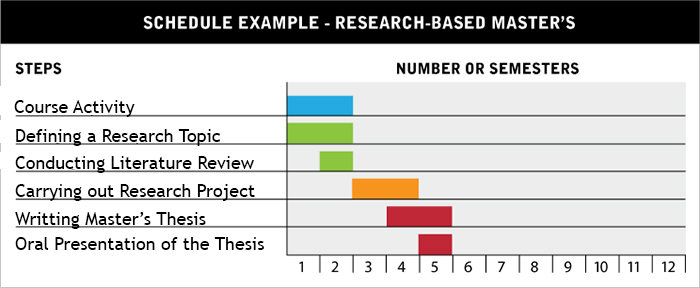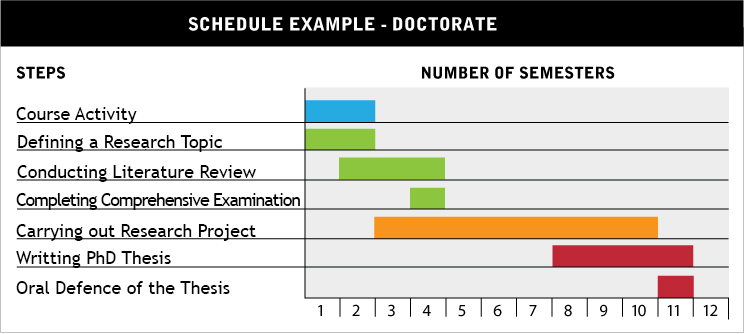Polytechnique Montréal offers a variety of microprograms, specialized graduate diplomas (DESS), professional or modular masters, research-based masters and doctorates (PhD).
> View all Graduate Studies Programs
Please note that the graduate degrees do not grant access to the Ordre des Ingénieurs du Québec, nor to the title of Engineer. If you do not have the required training to undertake this level of study, please visit training courses for engineers (in French only).
These programs are aimed at:
- holders of a Québec bachelor’s degree in engineering, pure or applied sciences;
- holders of an engineering diploma (equivalent to BAC+5 or Master 2);
- holders of a university degree from outside of Québec;
- holders of a master’s or a graduate degree in a relevant field.
Number of credits: 90 (60 to 75 attributed to research)*
Normal duration: between 3 and 4 years (full-time studies)
*A student who holds a graduate diploma or possesses relevant training including graduate courses (or the equivalent) may request to be partially or totally exempted
from course credits in his or her doctoral program (courses taken at Master's degree (Master 1 and Master 2) are not eligible for exemption, unless a second Master's degree was completed in a relevant field).
Read the eligibility conditions.
Program Objectives
Polytechnique's Ph.D. programs aim to help candidates:
- Develop the advanced knowledge, intellectual rigour, scientific curiosity and creativity;
- Understand and evaluate the scientific literature and develop rigorous reasoning and experimentation methods;
- Conduct an autonomous, innovative scientific research project;
- Publish and disseminate findings from such a project.
Targeted Skills
Ph.D. engineering programs aim to produce graduates who can:
- Directing both autonomously and expertly a scientific research project that makes an original contribution to knowledge or development in the areas of science and technology.
- Identifying, managing and analyzing information and resource materials relevant to one’s field of research.
- Communicating clearly in diverse settings scientific research results or knowledge in one’s field of study.
- Respecting standards, rules of ethics and fairness, as well as best practices for research.
- Committing to a process of lifelong learning and improvement.
Number of credits: 45 (15 course credits and 30 research credits)
Normal duration: 16 to 24 months (full-time studies)
Read the eligibility conditions.
Program Objectives
Research-based master's programs aim to:
- Increase student's scientific and technological knowledge in their field;
- Train students to conduct rigorous scientific research under professorial supervision and contribute to scientific developments in their field;
- Fully immerse students in the research process;
- Prepare for doctoral studies.
Targeted Skills
Research-based master’s engineering programs aims to produce graduates who can:
- Directing with rigour all stages of scientific research, under the supervision of experts; and participating in scientific and technological development.
- Identifying, managing and analyzing information and resource materials relevant to a research project.
- Communicating clearly the results of scientific research.
- Respecting standards, rules of ethics and fairness, as well as best practices for research.
- Committing to a process of lifelong learning and improvement.
Number of credits: 45 (6 to 15 credits for a project or internship)
Normal duration: 16 to 24 months (full-time studies)
These programs are also offered on a part-time basis.
Read the eligibility conditions.
Program Objectives
Professional master's programs aim to:
- Give students solid scientific knowledge in their field;
- train students to complete professional studies, developments or applications founded on methodologies or on scientific findings in their field.
Targeted Skills
Professional master’s engineering programs aim to train candidates able to:
- Carrying out a study or studies, projects, or professional applications based on methodologies or the state of the art in one’s field that is applicable to a question of interest in one’s professional environment.
- Enhancing or attaining advanced knowledge in one’s field as a means to increasing performance in one’s professional environment.
- Communicating clearly the results of a study, project or professional application carried out in one’s field.
- Respecting standards, rules of ethics and fairness, as well as best practices in relation to one’s work.
- Committing to a process of lifelong learning and improvement.
Number of credits: 30 (course credits)
Normal duration: 8 to 12 months (full-time studies)
These programs are also offered on a part-time basis.
There are many areas of specialty open to students wishing to embark upon specialised graduate studies. The DESS is a springboard to master's studies. Certain master's programs also recognize credits obtained in a DESS.
DESS students:
- can access the same graduate courses as master's and Ph.D. students;
- can complete their programs on a part-time basis;
- can complete their undergraduate training in their field of interest.
Read the eligibility conditions.
Targeted Skills
DESS programs aim to produce graduates who can:
- Enhancing or attaining advanced knowledge in one’s field and capable of calling upon such knowledge in diverse professional settings.
- Communicating clearly, in diverse professional settings, advanced knowledge in one’s field or discipline.
- Respecting standards, rules of ethics and fairness, as well as best practices in one’s field or discipline.
- Committing to a process of lifelong learning and improvement.
Number of credits: 9 to 15
Microprograms are particulary well suited to the needs of practising professionals. Completing 2 or 3 microprograms may lead to a DESS in Technology. These programs are also offered on a part-time basis.
Read the eligibility conditions.
Polytechnique Montréal graduates – Benefits of the Avantage Poly
Avantage Poly is reserved for graduates holding a bachelor’s degree from Polytechnique Montréal.
Avantage Poly allows students, with the authorization of their study or research supervisor or of the coordinator of their graduate program, to receive up to 15 credits for graduate courses taken within their undergraduate program, in a DESS program or a master’s program (professional or research-based).
Credited courses must be in the 6000 or 8000 series, and must have been successfully completed with a minimum grade of B.
Course material in the courses to be credited must be up to date. If the course was taken more than six years prior, the course will be subject to a confirmation request by a qualified authority to assess the educational content of the course in relation to current knowledge and technical practices.
Requests to have these credits recognized must be submitted during the first two semesters after registration in a specific graduate program and the courses must be registered in the student's program of study.
A grade of Y will be assigned to courses credited in the graduate program of study.
Pathway offered to all candidates
The direct entry from the master’s to the doctorate allows the student to start their doctoral studies without having to complete a master’s degree. This allows them to shorten their studies by 2 to 4 semesters (8 to 16 months).
To submit your application:
- Online Admission Application (with fees)
- Changement de programme aux études supérieures (.pdf - in French only)
- Research Topic And Timetable For PhD (.pdf)
- Study-Plan - Doctorate (PhD) (.pdf)
Pathway offered to all candidates
The direct entry from the bachelor’s to the doctorate allows the student to start their doctoral studies as soon as they complete their bachelor’s degree in engineering, without having to complete a master’s degree. This allows them to shorten your studies by a year and a half.
To be admitted, you must:
- have completed a bachelor’s degree in engineering or an equivalent degree (BAC+5 or Master 2 in the European system);
- have a GPA equal to or greater than 3.2/4.0.
Program details:
- standard doctorate (8 to 11 trimesters);
- 90 credits.
To submit your application:
- Admission form
- Send the required documents
Students can receive course credit exemptions if they have studied at a graduate level after obtaining their engineering diploma. (Note that courses taken during a master’s 1 or a master’s 2 pursued in Europe cannot be credited unless a second master’s 2 was followed in a relevant field.)
It is the student’s responsibility as well as the study or research supervisor’s to plan the studies in such a way as to respect the program’s deadlines.
The regular program length includes courses trimesters and writing/research trimesters for doctorate and research-based master’s programs. That number of semester should suffice to complete the activities required to meet the program’s requirements.
It is the student’s responsibility as well as the study or research supervisor’s to plan the studies in such a way as to respect the program’s deadlines.
The regular program length includes courses trimesters and writing/research trimesters for doctorate and research-based master’s programs. That number of semester should suffice to complete the activities required to meet the program’s requirements.
| PROGRAMS | NORMAL DURATION (FULL-TIME) |
| DESS | 2 to 3 semesters |
| Professional master's | 4 to 6 semesters |
| Research-based master's* | 4 to 6 semesters |
| Doctorate* | 8 to 11 semesters |
*Full-time participation only allowed for these programs
Academic time limit refers to the maximum number of semesters within which to complete a given program and meet the degree requirements.
The time limit, which commences with initial registration, includes:
- all semesters allotted to coursework and research
- extensions
- leaves of absence.
| PROGRAMS | TIME LIMIT (FULL-TIME) | TIME LIMIT (PART-TIME) |
| DESS | 6 semesters | 12 semesters |
| Professional master's | 9 semesters | 15 semesters |
| Research-based master's | 9 semesters | |
| Doctorate | 15 semesters |
Since the beginning of your studies, you have to agree with your study supervisor on a work schedule that will comply with the program’s normal duration of study. The first meetings with your supervisor and the drafting of your study plan are ideal stages to define a schedule and fill out the Research topic and timetable form (.pdf).
Research-based master's: before the end of your second semester
Doctorate: before the end of your third semesters
You should discuss the work stages to accomplish as well as their specific requirements. Evidently, the duration of the main stages will vary according to the research topic, the scope of work to be carried out, etc. The schedule can also evolve and be modified in the course of the program. The schedule is the working tool that will help you to respect your program’s duration.




